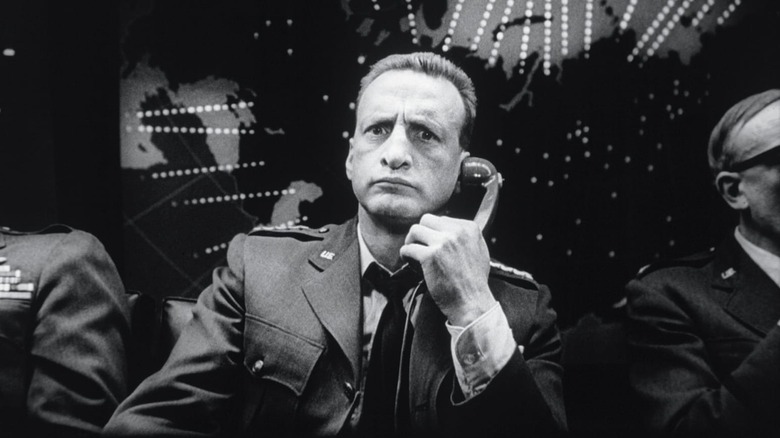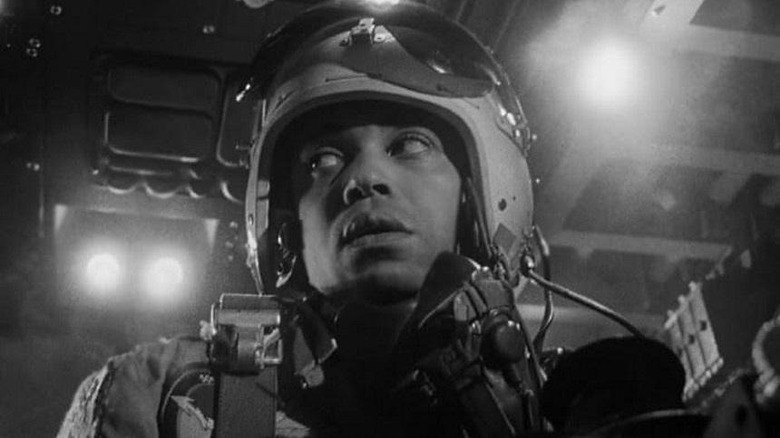The Only Main Actor Still Alive From 1964's Dr. Strangelove
Stanley Kubrick's 1964 classic "Dr. Strangelove or: How I Learned to Stop Worrying and Love the Bomb" remained depressingly relevant. We live on a planet wherein humans have invented single explosive devices powerful enough to eliminate all life on Earth, and yet they are being handled by whiny, insecure, clownish politicians and violence-obsessed military wonks with impotence and delusions of grandeur. It's telling that one of the biggest hits of 2023, Christopher Nolan's "Oppenheimer," was also about how petty egos tend to take precedence over the profound immoral invention of the nuclear bomb.
1964 was a time when phrases like "balance of power" were bandied about in the news, all while politicians and pundits argued about the moral righteousness of every major global superpower possessing the ability to destroy the world with equal skill. If everyone on Earth can blow up the planet, surely, then, everything is in perfect balance.
Kubrick understood the absurdity of that idea and made one of the savviest nuclear satires ever made. "Dr. Strangelove" is about a general named Jack D. Ripper (Sterling Hayden), who becomes obsessed with Communism and a non-existent Communist plot "to sap and impurify our precious bodily fluids." His beliefs cause him to order a nuclear attack on Russia — one the U.S. President (Peter Sellers) is unable to stop it, even with the aid of the blustering Buck Turgidson (George C. Scott). Sellers also played a visiting British soldier who interacted directly with Ripper, as well as the twisted ex-Nazi scientist of the title, who is possessed of some pretty bleak ideas of his own. Elsewhere, Slim Pickens plays the pilot of an ill-fated bomber, while Keenan Wynn plays an impatient soldier ordered to attack fellow Americans.
One major cast member is still with us, so let's take a look.
James Earl Jones as Lieutenant Lothar Zogg
James Earl Jones was 32 years old when he appeared in "Dr. Strangelove" as Lieutenant Lothar Zogg, the bombardier on board the B-52 fated to end the world. He only had a small role, sticking his head into the cockpit from time to time and asking the Slim Pickens character if he and his fellow soldiers had really, really received an order to attack Russia. A big part of the movie is the state of mind the soldiers have to get into to convince themselves that what they are doing is for the good of humanity. If they got the orders, then something really, really terrible happened back in the United States. Know that the soldiers are in a communication blackout, and their plane remains aloft 24 hours a day, refueled midair by gas planes.
"Dr. Strangelove" was Jones' first feature film role, although he had been a successful and acclaimed stage actor since at least 1958. He acted at the Cort Theater and the Eugene O'Neil Theater, performing plays by William Shakespeare, Jean Genet, and Bertolt Brecht. He played Othello in 1964 and Brutus in 1965. Jones was a busy, busy actor and had already begun winning awards when he appeared in "Dr. Strangelove." Film audiences may not have known who he was, but a debut with Stanley Kubrick was no small feat.
After "Strangelove," Jones' career only continued to grow. He appeared on "Sesame Street," "Roots," and "Jesus of Nazareth," as well as high-profile films like "The Greatest," the original "Star Wars" trilogy (he voiced Darth Vader), and "Exorcist II: The Heretic." His entire career is far too lengthy to list here.
At 93, Jones has semi-retired. His most recent film role was reprising King Jaffe Joffer in "Coming 2 America."

